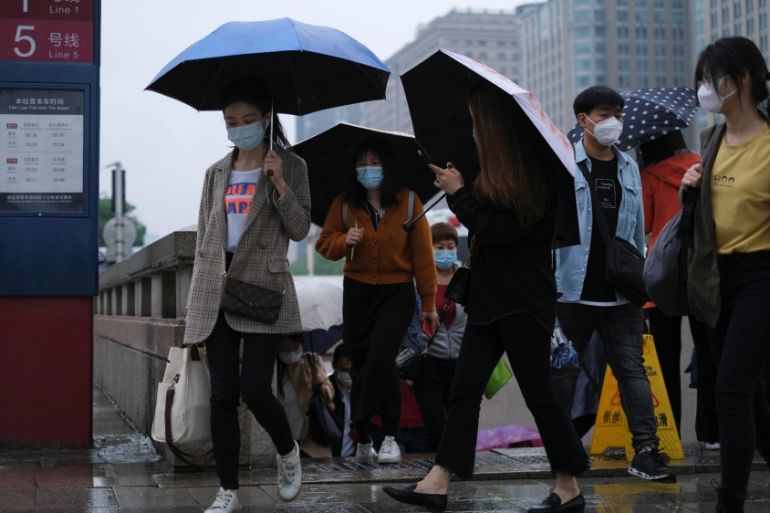Asian stocks rise on economic restart, even as virus cases mount
In an ongoing divergence between financial markets and the real economy, shares rallied although oil and bonds slipped.

Asian shares followed Wall Street higher on Monday as investors looked ahead to more countries restarting their economies, even as some reported an unwelcome uptick in new coronavirus cases and oil prices tumbled.
South Korea warned of a second wave of the new coronavirus as infections rebounded to a one-month high, while new infections also accelerated in Germany and China.
Keep reading
list of 3 itemsKuwait emir warns oil price drop will affect financial solvency
Wall Street jumps as historic job losses are less than expected
Still, investors seemed determined to stay optimistic and MSCI’s broadest index of Asia-Pacific shares outside Japan rose by 0.1 percent.
Japan’s Nikkei added 0.7 percent and South Korean stocks 0.3 percent. E-Mini futures for the S&P 500 opened soft but bounced back as the Asian morning wore on and was last up by 0.3 percent.
Wall Street rallied on Friday after the April payrolls report proved dire but not quite as awful as analysts’ worst fears.
“Just getting the worst jobs report in history out, is at the margins helpful for risky assets,” said Alan Ruskin, head of G10 FX at Deutsche Bank.
“Since late March there has been an extraordinary divergence between the real economy and financial risk, with the latter helped by unprecedented policy accommodation,” he added.
“Markets know the real economy data is awful. We are less sure of how long markets, aided by policy, can defy the real economy if the growth improvement is slow.”
Oil prices, however, declined almost $1 on Monday, reflecting concern over a persistent glut and economic gloom caused by the coronavirus pandemic.
Brent crude futures were down 73 cents, or 2.4 percent, at $30.24 a barrel by 01:14 GMT, while US.West Texas Intermediate crude futures fell 81 cents, or 3.3 percent, to $23.93 a barrel.
Both benchmarks have notched gains over the past two weeks as economies eased out of lockdowns and and fuel demand has rebounded modestly. Oil production worldwide is also declining, easing a supply glut slightly.
But oil traders remained cautious as the number of coronavirus cases climbed in China and South Korea.
“They’ve removed some of the lockdowns but does that mean the worse is over for now?” said Tony Nunan, a senior risk manager at Mitsubishi Corp in Tokyo.
The bond market certainly seems to think any recovery will be slow with two-year yields hitting record lows at 0.105 percent and fund futures of the US Federal Reserve, commonly known as the Fed, turning negative for the first time ever.
The rally in prices has come even as the US Treasury plans to borrow trillions of dollars in the next few months to plug a gaping budget deficit.
Fed chairman Jerome Powell is due to give a key note speech on Wednesday and analysts suspect he will rule out taking rates negative, at least for now.
The decline in US yields might have been a burden for the dollar but with rates everywhere near or less than zero, leading currencies have been stuck in tight ranges.
Against a basket of currencies, the dollar was idling at 99.837, sandwiched between support at 98.769 and resistance at approximately 100.40.
The euro was a fraction softer at $1.0830 against the Japanese yen, but above last week’s low at $1.0765.
In commodity markets, gold edged up 0.3 percent to $1,706 an ounce.